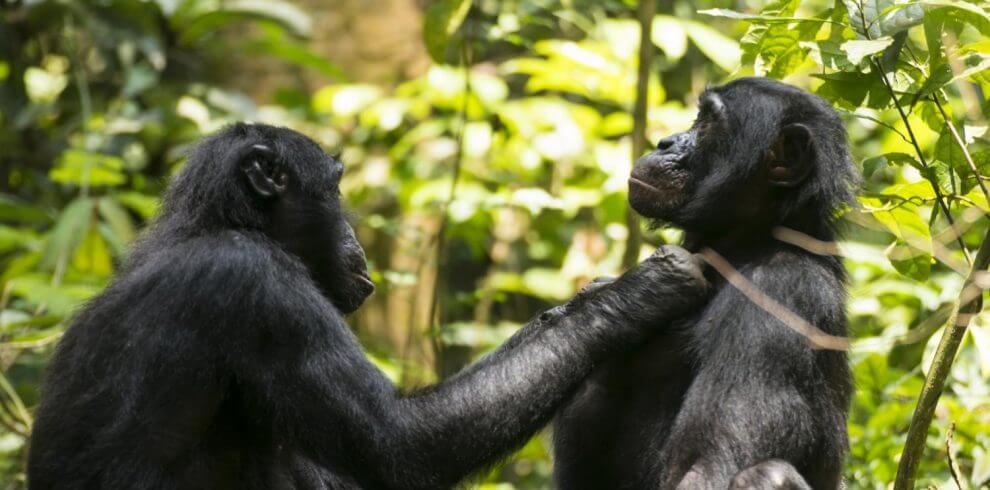This package brings you to visit bonobos in the wild in the heart of Africa. You will navigate up the Congo River to reach Tshumbiri in Mai-Ndombe Province in DR Congo. The Bonobos are a very rare animal to see in the wild. Additionally, the Bonobos are our closest living relatives, with more than 99% identical DNA. This comes as a unique experience as the Bonobos are endemic to the DR Congo.
This is not the Africa of Kenya or South Africa, this is raw, untouched, wild Africa. The experience of seeing the locals along the river going about their daily lives is something that, in all likelihood, can only be found in one or two places in the world. To visit bonobos in the wild will definitely not be an easy trip, it is an expedition. It will surely be very rewarding if you can handle the unpredictable environment that is the Democratic Republic of Congo. At the end of the trip, you will be among the rare tourist on the planet to visit bonobos in the wild.
Join our 2024 group tours
Renting out a speedboat or motorized canoe, a 4WD jeep Toyota land cruiser and other fixed costs making it harder (or expensive) for one or two people to engage in one of our tours to trekking bonobos in the wild. Reason why, we always organize one yearly group tour. Next year, from the 10th to the 16th of July 2024, we hope through this itinerary to bring a minimum of 5 people trekking bonobos in the wild. Please be advised. that the price quoted is for one person in a minimum of a group of 5 people. To confirm your booking you will just need a deposit of 500 USD which is 100% refundable should we fail to secure 5 people for the trip.
Update on the number of booking received so far: 1 booking (as of July 2023)
For more insights on visiting bonobos in the wild, please read our featured article.
Kwafrika Travel representative will pick you up from N’Djili International Airport in Kinshasa. You will then be whisked away to your hotel for a briefing and orientation. Overnight at Léon Hotel or Similar.
Boarding for Tshumbiri from a private port in Kinshasa, spend 4 to 12 hours of navigation (depending on what ferry you use) on the majectic Congo River. This part of the itinerary will allow you to discover the Congo river, its traffic and its inhabitants in a particular immersion formula approach.
You will arrive at around 6:00 p.m. As you arrive, we will leave the boat and transfer by jeep to Nkala to reach around 8:00 p.m. Free evening and night in a tent.
Wake up early at around 5 a.m. to go for the bonobos trekking in the wild. You will bring your breakfast with you. Trek the Bonobos and return to the village at around 12 noon. After lunch, courtesy visit to the chiefdom and tour of the village as you encounter with the Téké people. Around 4:30 p.m. attend to a show with the famous folklore Ekoul balow. Return to camp around 6.30 p.m. If interested you could have a chat with the staff of the NGO Mbomou tour. Nights in tent or inn Mbomou tour.
Go for a nature walk and meet with the téké people and their culture. In the afternoon, return to Tshumbiri for overnight.
Around 6:00 a.m. leave Nkala to Tshumbiri, as you arrive board your ferry and return to Kinshasa. Breakfast on board. Arrival in Maluku around 4:30 p.m. Goodbye the boat crew and transfer to the city center. Free evening. Night at the hotel
On this day you will discover Kinshasa's vibrant culture and history on a tour of the city that explores local landmarks, a bustling market, and the banks of the churning Congo River. Traveling with a local guide, you'll learn the stories behind each place you see, from the National Museum to Kabila's Mausoleum and the Place of Independence. You will also be brought in another incredibly unique aspect of Kinshasa, Sapeurs. La Sape is an abbreviated way to refer to the movement of Sapeurs. The translated meaning of the term La Sape is "Society of Ambiance-Makers and Elegant People". Also known as Congolese Dandies, the importance of physical appearance and attire is of the utmost and this is very clear, as you will see. You will experience the city in the safety of a private vehicle that will comfortably accommodate you, with all entrance fees included.
In the morning, you will be brought to N’djili International Airport for departure.
End of the trip.


Recent Comments